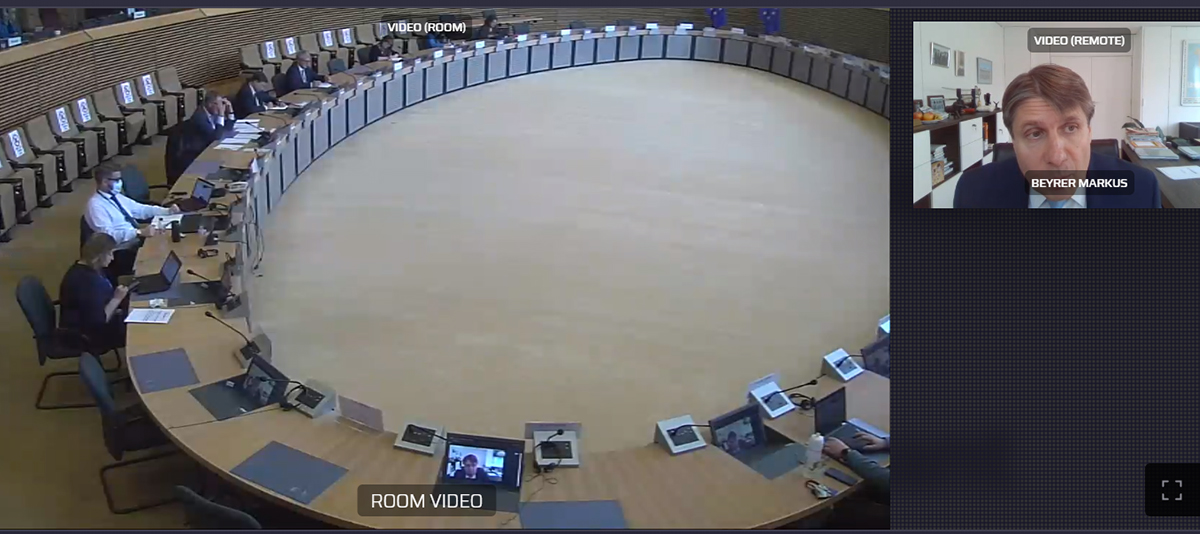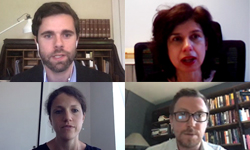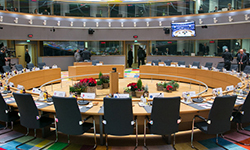BusinessEurope Headlines No. 2020-22
EU social initiatives need to reflect new realities due to COVID

"The forthcoming action plan on the European pillar of social rights has to be adapted to the new realities and challenges we face. And initiatives need to be taken at the right level". These were the key messages of BusinessEurope Director General Markus J. Beyrer, at a social partner hearing on 8 June on the action plan to implement the pillar. Beyrer noted that the recovery plan presented by the European Commission has the potential to make a real difference, given its financial weight, but that the right policies also need to be put in place. He stated that "the key tool to implement the pillar is the European Semester Process. We need to ensure that the resources available are used effectively to implement employment-enhancing reforms at national level. Bringing people back to work is the main priority in these times of crisis when many enterprises and workers struggle for survival". BusinessEurope proposes a tripartite approach, bringing together national governments, EU and national social partners and the European Commission to provide input on and come forward with a well-balanced action plan.
Contact: Rebekah Smith
Our comment
Discussion on own resources risks unnecessarily delaying recovery instrument agreement
By James Watson, Director for Economics
 In proposing a €750 billion EU recovery instrument, the European Commission has set out a recovery plan of the magnitude this crisis demands. But whilst many details will require difficult negotiations between EU Member States, there appears broad agreement that the instrument should be financed by the Commission borrowing on financial markets. Nevertheless, with the Commission concerned that repayments for the instrument will blow a hole in the EU's budget post 2028, and pressure also coming from the European Parliament, it has floated a raft of new long-term income streams including a possible digital tax, a carbon adjustment mechanism and a levy on firms using the single market. But such proposals, particularly when based around taxes as yet undeveloped, and requiring complex international agreement, risk unnecessarily delaying the rapid agreement on the recovery instrument needed to ensure the funds have maximum impact.
In proposing a €750 billion EU recovery instrument, the European Commission has set out a recovery plan of the magnitude this crisis demands. But whilst many details will require difficult negotiations between EU Member States, there appears broad agreement that the instrument should be financed by the Commission borrowing on financial markets. Nevertheless, with the Commission concerned that repayments for the instrument will blow a hole in the EU's budget post 2028, and pressure also coming from the European Parliament, it has floated a raft of new long-term income streams including a possible digital tax, a carbon adjustment mechanism and a levy on firms using the single market. But such proposals, particularly when based around taxes as yet undeveloped, and requiring complex international agreement, risk unnecessarily delaying the rapid agreement on the recovery instrument needed to ensure the funds have maximum impact.
Few topics in EU policy can be more misunderstood than own resources. A popular characterisation of the debate might be that the EU needs its own resources, or taxes, to avoid having to ask member states for contributions. But as Mario Monti's high-level group on own resources explained in their 2015 report[1], "the EU does not have the power to levy taxes, only national authorities do", with talk of EU taxes, at least in the context of the present treaties, therefore misleading. Furthermore, the treaties actually determine that the EU budget "shall be financed by own resources", with present financing, primarily through national GNI (output) based contributions, actually becoming own resources, once legally granted to the EU as part of each MFF agreement.
Given Member States' exclusive competence over taxation, the Commission's suggestion that new own resources could allow Member States' national contributions to decrease as a share of their economy is hugely questionable. Member States are all too aware that imposing new taxes will ultimately reduce disposable incomes for citizens, be it through higher prices, lower wages or smaller pensions. It is no more attractive for countries to hand over taxing rights to the EU than to hand over the direct proceeds of taxation.
Allocating an EU revenue steam from any specific tax levied by Member States across the EU is likely to lead to unnecessary admin costs, as well as drawing on leaders' precious negotiating time given, as the current system of VAT based contributions reminds us, agreement will normally require complicated adjustments to bring overall revenues from Member States back in proportion to GNI (the exception is where revenue cannot be easily allocated to a Member State, as is the case for customs duties, with the initial port of entry not necessarily in the Member State where the goods will be consumed). What in reality amounts to simply earmarking Member States' financial contributions to the EU as being from a specific tax stream makes no more economic sense than a shop demanding they are paid from a customer’s salary rather than investment income.
But given the significant administrative burden both for tax payers and enforcement authorities that any new tax creates, we should be particularly concerned when new taxes are proposed that fill no obvious gap in the present system. Whilst we await details of the single market contribution floated by the Commission, it is likely to resemble either a turnover tax, in which case, if implemented by Member States, the burden would be heavy for businesses with low profit margins, or will be based around profits and hence risk duplicating the existing corporate tax system and lead to double taxation.
Imposing a new, inefficient tax on business is not the way to meet the Commission's request that businesses contribute to rebuilding the single market in the recovery phase. Corporation taxes or their variants are, as the OECD reminds us, the most damaging taxes for investment, and as such risk undermining the positive initiatives set out elsewhere in the recovery plan. Now is certainly not the time to be imposing new costs on businesses.
If we are to avoid in the coming years, the difficult choice between significant cuts to spending on public services, or huge, and partly self-defeating, tax increases, there must be a renewed focus on growth-enhancing reforms. Rather than searching for new taxes that provide a narrow link to specific EU objectives, the Commission should make the best possible case for filling it post 2028 budget hole through increased GDP based contributions by Member States by spending the coming years dedicating itself to boosting prosperity and in particular, by ensuring that a deepened single market, made fit for the digital age, is an indisputable engine of EU growth.
[1]https://ec.europa.eu/info/strategy/eu-budget/how-it-works/long-term-planning/high-level-group-own-resources_en
The high-level group on own resources (HLGOR) was established in February 2014 to reflect on finding more transparent, simple, fair and democratically accountable ways to finance the EU.
The Group was chaired by former Italian Prime Minister and EU Commissioner Mario Monti.
Contact: James Watson
Belt and Road Initiative can help rebalance EU-China relationship
 “The Belt and Road Initiative (BRI) can also help rebalance the EU-China relationship making it stronger and fairer. For this to happen BRI needs to become more accessible to European companies, follow international standards and rules, be financially more sustainable and more transparent in its objectives and implementation”, said Luisa Santos, Deputy Director General of BusinessEurope, in the webinar “Can China’s Belt and Road Initiative in Europe revitalise trade in a time of division?” on 8 June, organised by Women in International Trade. The Belt and Road Initiative is the main foreign economic diplomacy tool used by China not only in Europe but also in Asia and Africa. However, some of its structural problems are now becoming increasingly visible. Santos pointed out that there can be synergies between China’s Belt and Road Initiative and the EU’s connectivity strategy. For instance, if BRI is more open to non-Chinese operators, if it follows OECD rules when it comes to access to finance, if it supports more sustainable projects. “On the other end the EU’ s connectivity strategy needs to be better promoted and have the financial means to match its ambition. The ultimate objective should be to increase connectivity between Europe and Asia bringing more trade, investment and economic development to countries in the two regions”, she said.
“The Belt and Road Initiative (BRI) can also help rebalance the EU-China relationship making it stronger and fairer. For this to happen BRI needs to become more accessible to European companies, follow international standards and rules, be financially more sustainable and more transparent in its objectives and implementation”, said Luisa Santos, Deputy Director General of BusinessEurope, in the webinar “Can China’s Belt and Road Initiative in Europe revitalise trade in a time of division?” on 8 June, organised by Women in International Trade. The Belt and Road Initiative is the main foreign economic diplomacy tool used by China not only in Europe but also in Asia and Africa. However, some of its structural problems are now becoming increasingly visible. Santos pointed out that there can be synergies between China’s Belt and Road Initiative and the EU’s connectivity strategy. For instance, if BRI is more open to non-Chinese operators, if it follows OECD rules when it comes to access to finance, if it supports more sustainable projects. “On the other end the EU’ s connectivity strategy needs to be better promoted and have the financial means to match its ambition. The ultimate objective should be to increase connectivity between Europe and Asia bringing more trade, investment and economic development to countries in the two regions”, she said.
Contact: Maurice Fermont
Discussing trade and climate with French government official and MEP
 BusinessEurope welcomed Jonathan Gindt from the French Treasury to its Trade and Climate taskforce on 9 June. He presented the recent proposal by the French and Dutch governments on how to strengthen sustainability aspects in EU Free Trade Agreements. He also voiced the wish of both Member States to have the World Trade Organisation play a more prominent role in addressing the global challenges of climate change and biodiversity preservation. This was followed by an active debate with the Member of the European Parliament (MEP) Pascal Canfin, Chairman of the Environment Committee of the European Parliament, on the design and effectiveness of a Carbon Border Adjustment Mechanism. MEP Canfin stressed the importance of having a common European industry view on the matter and therefore welcomed BusinessEurope’s plans to publish a wider trade and climate paper as soon as possible.
BusinessEurope welcomed Jonathan Gindt from the French Treasury to its Trade and Climate taskforce on 9 June. He presented the recent proposal by the French and Dutch governments on how to strengthen sustainability aspects in EU Free Trade Agreements. He also voiced the wish of both Member States to have the World Trade Organisation play a more prominent role in addressing the global challenges of climate change and biodiversity preservation. This was followed by an active debate with the Member of the European Parliament (MEP) Pascal Canfin, Chairman of the Environment Committee of the European Parliament, on the design and effectiveness of a Carbon Border Adjustment Mechanism. MEP Canfin stressed the importance of having a common European industry view on the matter and therefore welcomed BusinessEurope’s plans to publish a wider trade and climate paper as soon as possible.
Contact: Leon de Graaf
Message to EU Competitiveness Council of 12 June
 On 12 June the EU Competitiveness Council holds its informal video-conference meeting to discuss the European Recovery Plan and agree on a statement in this regard. BusinessEurope addresses the competitiveness ministers of the EU in a letter providing a preliminary assessment of the proposed Recovery Plan. As we project the EU economy to contract by around 8% in 2020 and to only approach pre-crisis output levels at the end of 2021, speedy agreement on the plan and getting the measures and monitoring right are key. While the recovery plan is of sufficient financial weight to potentially make a real difference in the recovery and while it is positive to see the Green Deal and Europe’s digital capacity at the centre of the recovery strategy, it is essential to go beyond if we want to make this work as a growth strategy. BusinessEurope also attaches great importance to the non-financial part of the recovery actions, where the role of the Competitiveness Council should be central. For example, the Commission misses the opportunity to suggest the single market reform agenda to remove bottlenecks in the goods markets and further open the services markets where job creation potential is greatest. In this relation, BusinessEurope also agreed on our response to the March Single Market governance package which we trust will help defining the much needed future single market agenda and can be found here.
On 12 June the EU Competitiveness Council holds its informal video-conference meeting to discuss the European Recovery Plan and agree on a statement in this regard. BusinessEurope addresses the competitiveness ministers of the EU in a letter providing a preliminary assessment of the proposed Recovery Plan. As we project the EU economy to contract by around 8% in 2020 and to only approach pre-crisis output levels at the end of 2021, speedy agreement on the plan and getting the measures and monitoring right are key. While the recovery plan is of sufficient financial weight to potentially make a real difference in the recovery and while it is positive to see the Green Deal and Europe’s digital capacity at the centre of the recovery strategy, it is essential to go beyond if we want to make this work as a growth strategy. BusinessEurope also attaches great importance to the non-financial part of the recovery actions, where the role of the Competitiveness Council should be central. For example, the Commission misses the opportunity to suggest the single market reform agenda to remove bottlenecks in the goods markets and further open the services markets where job creation potential is greatest. In this relation, BusinessEurope also agreed on our response to the March Single Market governance package which we trust will help defining the much needed future single market agenda and can be found here.
![]()
![]() Contact: Martynas Barysas
Contact: Martynas Barysas
Sustainable finance strategy: debate with European Banking Federation
 Around 40 experts of BusinessEurope's Sustainable Finance task force discussed the EU Sustainable Finance agenda with Denisa Avermaete from the European Banking Federation (EBF). If well-designed and accompanied by the right tools and frameworks, a renewed Sustainable Finance strategy can create an enabling agenda that supports European businesses in their innovative transformation towards climate neutrality, sustainable growth, job creation and prosperity. The discussion showed that, for this to happen, the Sustainable Finance agenda has to focus on accommodating the needs of the finance and the real economy and finally lead to mobilisation of finance to support the transition. The dedicated task force on Sustainable Finance has been set-up to coordinate and develop input to the current discussion on a renewed European sustainable finance strategy. The key priority will be to develop a strategy that effectively channels money to increase sustainability and supports the recovery. The group brings together experts from different policy background to discuss the links between sustainable finance taxonomy, non-financial reporting, corporate governance, EU financing instruments and related topics in the context of the Sustainable Europe / Green Deal investment plan.
Around 40 experts of BusinessEurope's Sustainable Finance task force discussed the EU Sustainable Finance agenda with Denisa Avermaete from the European Banking Federation (EBF). If well-designed and accompanied by the right tools and frameworks, a renewed Sustainable Finance strategy can create an enabling agenda that supports European businesses in their innovative transformation towards climate neutrality, sustainable growth, job creation and prosperity. The discussion showed that, for this to happen, the Sustainable Finance agenda has to focus on accommodating the needs of the finance and the real economy and finally lead to mobilisation of finance to support the transition. The dedicated task force on Sustainable Finance has been set-up to coordinate and develop input to the current discussion on a renewed European sustainable finance strategy. The key priority will be to develop a strategy that effectively channels money to increase sustainability and supports the recovery. The group brings together experts from different policy background to discuss the links between sustainable finance taxonomy, non-financial reporting, corporate governance, EU financing instruments and related topics in the context of the Sustainable Europe / Green Deal investment plan.
Contact: Asdin El Habassi
Response to "smart sector integration" strategy
 “In the recent decades the upscale of renewable electricity production has been quite significant. […] However, there are sectors and applications where direct electrification might not be feasible nor possible with the technologies currently at hand. In view of Europe’s energy transition, the discussions on the role of renewable and low carbon gases and fuels in an integrated energy mix are extremely important”, commented BusinessEurope in its response to the European Commission’s consultation on a European Strategy for Smart Sector Integration. The strategy is expected to bring together the different energy networks, and will link them to the energy consuming sectors (i.e. transport, industry, buildings, etc.). BusinessEurope also underlined that “Getting closer to an increasing renewable electricity system, will lead to a higher demand for flexibility and all types of storage that low carbon energy carriers could provide”. BusinessEurope’s full response can be found here.
“In the recent decades the upscale of renewable electricity production has been quite significant. […] However, there are sectors and applications where direct electrification might not be feasible nor possible with the technologies currently at hand. In view of Europe’s energy transition, the discussions on the role of renewable and low carbon gases and fuels in an integrated energy mix are extremely important”, commented BusinessEurope in its response to the European Commission’s consultation on a European Strategy for Smart Sector Integration. The strategy is expected to bring together the different energy networks, and will link them to the energy consuming sectors (i.e. transport, industry, buildings, etc.). BusinessEurope also underlined that “Getting closer to an increasing renewable electricity system, will lead to a higher demand for flexibility and all types of storage that low carbon energy carriers could provide”. BusinessEurope’s full response can be found here.
![]() Contact: Cecilia Serrano-Piedecasas
Contact: Cecilia Serrano-Piedecasas
The SME strategy has to play a key role in COVID-19 times
 “The implementation of the European Commission’s SME strategy can play a key role in supporting forcefully and swiftly SMEs in these difficult times. Yet, a re-prioritisation of the measures therein proposed taking into account the serious consequences of the outbreak of COVID-19 is needed”, said Anna-Lena Bohm, Chair of BusinessEurope's “Entrepreneurship and SME” Committee during the SME Envoy Network online meeting on 10 June. Together with other business organisations, BusinessEurope exchanged views with Commission Director General Kerstin Jorna, responsible for Internal Market, Industry, Entrepreneurship and SMEs. During the debate Anna-Lena stressed some priority areas: “For BusinessEurope, while on the longer-term the focus on a sustainable and digital Europe should be maintained, efforts should now be made in areas that could benefit SMEs in the short/medium term”. She pointed out that finance and special COVID-19 financial support should be accessible through quick and agile procedures; institutions should do everything in their capacity to maintain a functioning Single Market as well as reducing barriers to exports; SMEs should not be confronted with unnecessary regulatory burden; in order to facilitate cross-border activity of SMEs in the EU, the Commission should continue to explore the possibilities for a European company law form designed for SMEs, taking inspiration in the work done on the European Private Company proposal.
“The implementation of the European Commission’s SME strategy can play a key role in supporting forcefully and swiftly SMEs in these difficult times. Yet, a re-prioritisation of the measures therein proposed taking into account the serious consequences of the outbreak of COVID-19 is needed”, said Anna-Lena Bohm, Chair of BusinessEurope's “Entrepreneurship and SME” Committee during the SME Envoy Network online meeting on 10 June. Together with other business organisations, BusinessEurope exchanged views with Commission Director General Kerstin Jorna, responsible for Internal Market, Industry, Entrepreneurship and SMEs. During the debate Anna-Lena stressed some priority areas: “For BusinessEurope, while on the longer-term the focus on a sustainable and digital Europe should be maintained, efforts should now be made in areas that could benefit SMEs in the short/medium term”. She pointed out that finance and special COVID-19 financial support should be accessible through quick and agile procedures; institutions should do everything in their capacity to maintain a functioning Single Market as well as reducing barriers to exports; SMEs should not be confronted with unnecessary regulatory burden; in order to facilitate cross-border activity of SMEs in the EU, the Commission should continue to explore the possibilities for a European company law form designed for SMEs, taking inspiration in the work done on the European Private Company proposal.
Contact: Daniele Olivieri
Calendar 
- 18 June: 25th European Corporate Governance Conference
- 22-26 June: EU Sustainable Energy Week 2020
- 9-10 September: 8th International Conference on Sustainable Development
Reminder: please have a look at our privacy policy